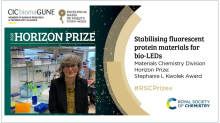
A research team from the Technical University of Münich, the Center for Cooperative Research in Biomaterials (CIC biomaGUNE), the University of Erlangen-Nuremberg, and the Materials Physics Center (CFM) has been awarded with the 2021 Materials Chemistry Division Horizon Prize, Stephanie L Kwolek Award, for stabilisation of fluorescent proteins in polymer coatings and their use in bio-based lighting technology. In the ARTIBLED FET-OPEN project, funded by the European Commission, they have created sustainable, stable and highly performing light-emitting diodes (LEDs), using fluorescent proteins as colour filters.
In biology, there are fluorescent proteins that exhibit excellent photoluminescence – however, these proteins are not stable when outside of the cell. The team developed a method whereby the proteins are stabilised in dry polymer films, and they retain their photoluminescent properties for years. The properties of the polymer protecting the proteins also mean that they can be used in diverse applications. These fluorescent proteins can be used to make LEDs that are higher performing, more efficient and sustainable than most current LEDs.
Typical LED lighting uses cerium or cadmium compounds that are environmentally hazardous, costly to make and rely on trace elements, without any efficient recycling methods. The replacement of these LEDs with ones made with fluorescent proteins would therefore be more sustainable.
The international team, in which participates the Ikerbasque Research Professor Aitziber L. Cortajarena (from CIC biomaGUNE) as expert on protein engineering, have created a bridge between biology and optoelectronics, which has opened opportunities for other researchers to investigate fluorescent protein-based energy devices, as well as new stabilisation techniques. In addition to applications in lighting, these bio-LEDs have potential for use in medical diagnosis and industrial reaction catalysis.
“The 2021 Horizon Prize nicely highlights our efforts towards shaping a new concept in artificial illumination. Safety, efficiency, and stability have driven our technological society. Sustainability is our next big step”, states Professor Rubén D. Costa, from Technical University of Münich.
